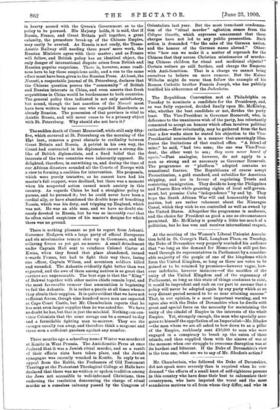The Republican Convention met at Philadelphia on Tuesday to nominate
a candidate for the Presidency, and, as was fully expected, decided finally upon Mr. McKinley, who, whether the best candidate or not, divides the party least. The Vice-President is Governor Roosevelt, who, in deference to the unanimous wish of the party, has reluctantly consented to accept an honour which often involves political extinction.—How reluctantly, may be gathered from the fact that a few weeks since he stated his objection to the Vice- Presidential nomination in a manner that amusingly illus. trates the limitations of that exalted office. "A friend of mine," he said, "had two sons; the one was Vice-Presi- dent, the other went to sea ; they were never heard of again."—Past analogies, however, do not apply to a man so strong and so necessary as Governor Roosevelt. The programme or " platform " adopted contains no sensational feature. The Republicans of course accept Protectionism, a gold standard, and subsidies for American shipping, and are in favour of regulating Trusts and restricting immigration. They decide to keep the Philippines and Puerto Rico while granting rights of local self-govern. ment, but promise Cuba "independence " by and by. They hope the South African War will end honourably for both parties, but are rather vehement about the Nicaragua Canal, which they wish to see controlled as well as owned by the United States. Altogether the programme is moderate, and the choice for President as good a one as circumstances permitted. Mr. McKinley is possibly a little too much of a politician, but he has won and receives international respect.


































 Previous page
Previous page